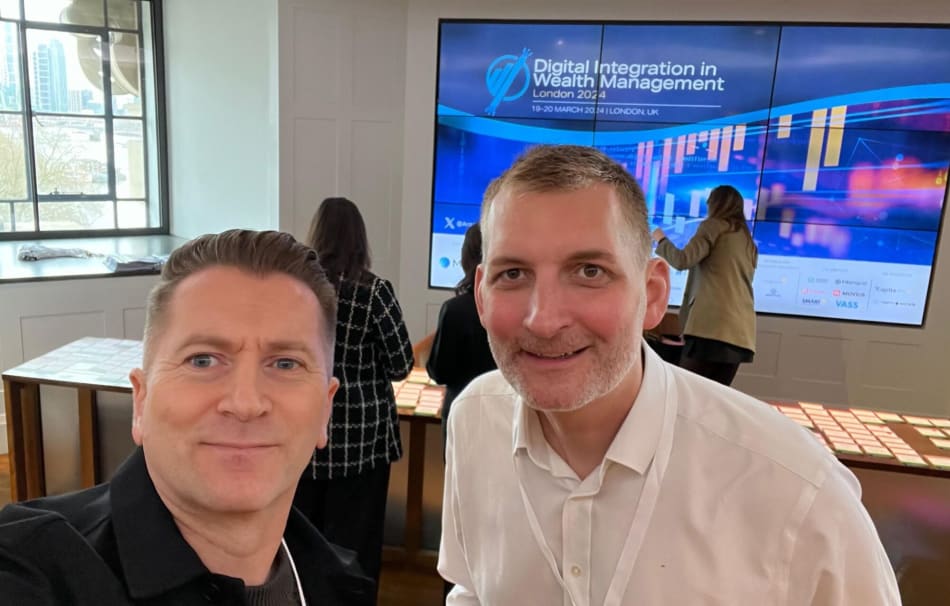
We were delighted to sponsor and attend Arena International’s ‘8th Annual Digital Integration in Wealth Management’ conference in London on the 19th & 20th of March 2024.
We had such an enjoyable time that we collated some of the key themes and most insightful takeaways for anyone who wasn’t able to make the time to attend (or who didn’t take quite such detailed notes as Mike & I !).
The event boasted a fabulous range of speakers and a diverse range of attendees representing many of the UK’s leading wealth and asset managers, private banks and technology vendors. The topics presented and debated were from the forefront of change in the industry and reflected the critical digital technology solutions that companies need to be thinking about to attract & retain customers and remain relevant in an ever changing competitive landscape.
From our own experience and understanding, it’s becoming increasingly challenging for operators in wealth management to compete in the market. Loyalty is hard to command, as both traditional & next generation investors are growing sophisticated and more intentional with how they protect capital and grow wealth. These discerning cohorts have high expectations for seamless experiences augmented by digital and particularly mobile experiences.
Digital technology provides massive opportunity but also a competitive battleground, and the demands of clients are clear.
A few statistics from Accenture’s ‘Keeping me Invested’ Wealth Management Survey from 2022 point to this – 42% of clients choose Wealth Managers based on tech offerings, 43% say that improving technology is key to keep them as a client, and 34% will entrust more assets if there is a more personalised experience.
Below are our takes on the top themes that came out of the conference and the implication for your digital technology plans!

Know your customer – Consumer duty and suitability
The FCA’s Consumer Duty regulation and the implications for suitability and fee transparency were topics covered across many talks. The need to deeply understand a client’s circumstances, needs and preferences, to produce recommendations that are clearly aligned and understood by the client, and to continuously monitor suitability and changing client goals are critical to build positive client relationships and to remain compliant with evolving regulations.
Goal-based planning enables a clearer understanding of what good outcomes look like for each client, and enables a more holistic discussion that helps a client to visualise how guidance and advice is linked to the potential achievement of these outcomes.
The topics of asking the right questions, behavioural design techniques and understanding personality traits that can lead to a better understanding of client behaviours and biases, and also their preferences for communication, were covered as forward thinking ways of looking at this and a move away from traditional client segmentation.
This leads into client education, and the importance of advancing the financial literacy and understanding of clients, while communicating and visualising information in ways that they will understand and be receptive to, across channels they feel comfortable in already. Vulnerable Customers and Accessibility were both mentioned regularly across both days, with Health and Money highlighted as the two key stressors for all clients, and why it’s so important to provide digital experiences that focus on alleviating these stresses, in order to deliver good outcomes.
Finally it was noted that knowing your client is not just a regulatory mandate, it’s also crucial to achieve business objectives to retain clients through better service, and to identify upsell and cross sell opportunities. Understanding behavioural biases helps to manage the investor as well as the investments, and can combat issues such as clients being under-invested, or under-risked for their level of investment. Helen Russell-Hughes of Charles Stanley rightly called out that KYC isn’t just about regulation, it’s an amazing opportunity to meet the core needs of clients, and really build trust.
Digital technology implications:
- Automated and self-service client data capture: Automation of the collection of basic client information during fact finding through existing data sources and easy to use digital questionnaires can free up time for advisors to have more holistic conversations
- AI / Gen AI: AI can be used to bring behavioural science into the advice process and to deliver personalisation at scale
- Automated monitoring: Ongoing monitoring of the client and their current portfolios can identify allocations that have become unsuitable.

Client empowerment
Giving clients a sense of empowerment was identified as the key to engaging with them on an emotional level and creating a positive emotional experience (with data from a Morningstar report backing this up). Clients feel empowered when they have trust in the system and when their investments have a sense of personal meaning. This is consistent across all demographics and wealth brackets. Iain Cowell highlighted the importance of this and the approach that Franklin Templeton are taking to ensure their customers feel empowered. As an industry, portfolio planning has historically been based almost exclusively on risk and performance, however the demand is changing and wealth managers need to adapt to this new direction of travel.
Understanding what is meaningful to clients, and factoring this into guidance and advice, is a key starting point for empowerment. This means providing personally relevant investments, for example ESG related preferences or sectors and companies that align with individual lifestyle choice, beliefs and values.
Providing deeper visibility for clients into investments and their characteristics should be prioritised, giving investors the ability to drill into their portfolios to see information relevant to their preferences (for example ESG information/scores), enabling intentional investing, and affording clients the ability to Self Actualise (Maslow’s Hierarchy of Needs).
Celeste Leverton of Coutts & Co. made a very good point about getting the balance right when it comes to providing this level of detail to clients about their portfolios. Don’t assume that clients won’t read details – in her experience, with many clients becoming more sophisticated, some may have preferences for long form content, and the importance of using accessible, clear language.
Digital technology implications:
- Data visualisation and presentation: Digital experiences to visualise portfolios and drill down into investments and characteristics of companies (e.g. ESG characteristics)
- Digital security: Clients must have trust in technology, and this means using the highest levels of security such as mobile biometric authentication and data encryption, giving clients reassurance that their data is secure
- Digital assets and tokenization: can help to make a wider range of investments available that may align more with client preferences and lifestyles (e.g. new asset classes – Rhianna as an example).
Hyper-personalised experiences – Design for humans
Personalisation was covered in many talks as a critical component of loyalty and client retention. This follows on from the need to know customers deeply to then apply this knowledge to provide a personalised experience.
Many of the speakers highlighted the importance of Agile, Human Centred Design and conducting regular qualitative and quantitative User Research, to explore the core emotional needs and goals, perceptions, attitudes and behaviours of clients. Umar Zaman of BNY Mellon Pershing, Carsten Heckemüller of Deutsche Bank and Helen Russell-Hughes of Charles Stanley all advocated strongly in their talks for using contemporary UX methods including conducting structured User Interviews to gather insights, User Surveys to help with granular audience segmentation and the creation of Personas or Behavioural archetypes, Customer Journey or Customer Experience Mapping to build a holistic picture of all digital & offline touch points, and Service Blueprinting to identify where the opportunities may be to delight both clients and wealth managers alike.
Psychometric Testing was also highlighted as a useful way to understand a client’s unique personality traits and decision making preferences, in order to then provide personalised product recommendations that align with real meaning for clients, and also to create subtle moments of dynamic personalisation – right place, right time, right content. This also really leans into the concept of Empathy Mapping, building an understanding of what clients are Seeing, Thinking, Doing and Feeling.
Importantly, User Testing (both moderated testing and also AB testing), were called out as great ways of validating the direction of a new feature or new product, identifying if it works as intended for users, and acting as a very effective way of reducing the cost of development.
An impactful omnichannel experience (see more below) combines digital personalisation with an informed advisor who is freed from routine work to focus on high quality and highly personalised conversations.
Digital technology implications:
- Human Centred Design: Become a design-first organisation. Do ongoing research, gather insights to inform the design of dynamic and personalised digital experiences that clients will love
- Customer expectations: Tesla, Apple, Amazon etc – the benchmark is set high, customers expect intuitive digital financial experiences that align with the other services they already use
- Mobile: mobile apps provide a perfect channel for the delivery of personalised real-time content, notifications and Helpful Behavioural Interventions, such as nudges
- AI / Gen AI: Using AI / Gen AI to create insights and tailor personalised content, for example next-best actions models combined with Gen AI crafted messaging unique to the individual.

Omni-channel experiences
We heard a lot about how advances in digital experiences, self-service capabilities and automation can improve customer satisfaction and retention, and help to reach underserved segments efficiently. However, the advisor relationship is still desired and is a key part of the experience for all generations and wealth segments, so delivering on a seamless omni-channel experience is critical.
Omni-channel is different to multichannel, in that in a true omnichannel experience all channels are integrated to provide a seamless experience. As clients move between mobile, email, call centre and face-to-face advisor interactions they should feel a natural flow and alignment across all.
Omni-channel is also important for advisor experience and can combat perceived fears that digital wealth will replace the advisor. A good omni-channel experience supports an improvement in advisor productivity and effectiveness and routine tasks can be self-served. Advisors can be provided with rich client analytics and insights, to prepare them for high quality value-adding conversations. A great phrase used by Charles Stanley is “Digital when it’s helpful and People when it matters”.
The modern client journey doesn’t just start with onboarding, there can be multiple starting points, both offline or online. Wealth Managers need to consider the end to end experience holistically, and ensure that every touchpoint is consistently delightful for clients.
Agility is an absolute prerequisite for modern Wealth Managers to successfully deliver omni-channel – it’s never been more important for operators to apply Agile principles cross-organisation, enabling quicker technology choices and implementation, and the ability to swiftly respond to changes in the market, new regulations, increasing competition and constantly evolving customer expectations.
Derek Shanks, Engineering Director, Head of Digital Investing, Wealth & CRM at Barclays Wealth reinforced the importance of technology transformation – encompassing platforms, people and processes. Seamless digital and mobile experiences in the front end, can only be delivered properly when backend platforms are interoperable.
Digital technology implications:
- Customer research and experience design: This is critical to achieve omnichannel experience, experience design must be built into all channels to enable a seamless journey. Service Design provides the complete view of how client experience aligns with service delivery
- Mobile / web customer apps: A robust and secure digital experience across all touch points that provides clients with the information and insights that they need, self-serve capability for routine tasks, and a direct link to their advisor
- Advisor digital dashboards: A digital dashboard that provides insights and analytics to advisors to understand clients journeys across channels, prepare them for higher value conversations and enable them to communicate responsively over digital
- Scalable and interoperable back-end architectures: The days of the monolithic ‘off the shelf’ solutions are numbered and it’s the operators in wealth that lean on the API economy, and implement real time, event-driven, microservices based and flexible enterprise architectures that truly support agility, who will succeed in the market

Serving multiple generations and wealth segments
How to support customers across generations and wealth brackets was a big and timely topic. There are many underserved segments in the market and the advice gap is real, mass affluents for example are being targeted with digital solutions to move them from guidance to advice. Firms are looking to appeal to younger demographics, with “Next Gen” being a consistent theme across almost all of the talks. Mass Market, Mass Affluent, High Net and Ultra High Net Worth audiences all need differing holistic engagement strategies that suit their unique needs.
Alongside this dynamic was a focus on intergenerational wealth transfer within families. In research conducted by Schroders, “65% of inheritors do not intend to continue using their parents’ financial adviser after they receive an inheritance”, and so as baby boomers passdown inheritance, how to address this statistic becomes paramount. Building a relationship based on trust early with younger generations in a family is one solution to this, and this means being able to provide the right experience to suit different generations who have very different needs, preferences and behaviours.
There is a spectrum of changing needs as you move from Baby Boomers to Gen X, Millennials and Gen Z with preferences/needs shifting from risk-averse protection and decumulation, traditional assets and face-to-face service to an investor base who are more digital-first and mobile-first, values-based and social media driven. However it’s not black and white, and individual understanding is required.
Encouraging and providing a forum for family discussion and education is also helpful to build relationships and trust. For example, tackling the difficult subject of later life care and creating a plan about how that will be supported. Nina Manning at Killik & Co. brought to life how they’ve been creating digital tools that support and act as a gateway to conversations between parent and child, with importance placed on starting these conversations early in life in order to build good financial literacy.
Digital technology implications:
- Mobile capabilities: Mobile is ubiquitous, it’s the key channel and it becomes even more important when trying to reach and engage with younger digital-native generation
- Omni-channel experience: It’s clear that first class digital capabilities are desired by all demographics, but the degree to which they will be used changes and there is also desire for personal interaction with advisors. So a digital platform that supports seamless omnichannel journeys is important
- Channels and adaptive experiences: Design for the channels that are appropriate for the user, for example with younger audiences lean on influencers and social proofing, and be mindful that user needs and goals evolve and change over time, so platforms, messaging and services need to evolve and adapt in sync with the audience
- Intergenerational planning: Systems to support intergenerational planning, to capture varying goals and objectives across family units and consolidate this into a single family view with associated analytics and optimised recommendations

Conclusion
The clear message from the conference was that in order to both retain existing clients and capture the investors of tomorrow, it’s important to find the optimum combination of people and technology, and to really know clients in order to deliver on personalisation and omni-channel experience at scale.
Front-end digital technology is there to be leveraged – intelligent mobile experiences combining the best of human-centred design, consumer mobile technology and AI-driven insights. This must also be combined with modernisation on the back-end and in the middle and back office to create modern cloud-based agile architectures that support business responsiveness and agility.
If you’d like to discuss these themes in more detail and the digital technology solutions that underpin them, then please get in touch. Waracle is a digital technology consultancy specialising in creating client-facing digital experiences and AI solutions in wealth and asset management.

Authors
Managing Director
Client Partner
Related

Article • 10 February 2026
Waracle’s 2026 Strategy – Building the Benchmark for Modern Consultancy




